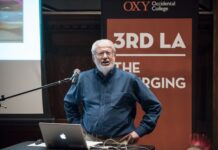Former Mayor of South Bend, Indiana, Pete Buttigieg, the first openly gay presidential candidate, has achieved surprising successes in early democratic caucuses. He came first in Iowa and second in New Hampshire. Nonetheless, the LGBTQ+ community’s reaction to him has been lukewarm at best.
Buttigieg presents a very specific image of queerness — one that is indistinguishable from heterosexuality in every aspect but the gender of its participants. His emphasis on traditional masculinity, religiosity and family values distances him from stereotypical representations of the LGBTQ+ community. His centrist politics alienate him from the intersectional goals of the gay liberation movement. As a queer woman, I have been monitoring Buttigieg since he announced his candidacy. A victory for Buttigieg would be less of a victory for the queer community than further proof that a white, male, Christian veteran with an Ivy League education remains — for many voters — the preferred face of America’s highest office.
Greta La Fleur, American Studies professor at Yale University, made a similar argument analyzing a cover of Time magazine featuring Buttigieg and his husband Chasten. The cover, captioned “First Family,” depicts the couple in front of a big house with a white fence. They are both dressed in plain button-downs, navy slacks and brown belts, standing close to each other in a subtle, inoffensive embrace. As a whole, the image reaffirms the middle-class wholesomeness of Buttigieg’s marriage.
This presentation of queerness recalls the homophile movement, an oft-forgotten post-war, pre-1960s international gay rights movement. Middle-class white men almost entirely pioneered the homophile movement, focusing on desexualizing queerness and distancing it from stereotypes of degeneracy. The word homophile itself translates to “same-love,” a replacement for the more popular homosexual, or “same-sex.” The better known gay liberation movement of the 1960s and ’70s criticized the homophile movement for its strict enforcement of traditional masculinity and exclusion of working-class people, women and people of color.
An open letter from Queers Against Pete leveled these same criticisms at Buttigieg, contending that Buttigieg’s rejection of policies like Medicare For All and student debt cancelation proposed by more progressive candidates would hurt queer people outside of the middle class. They said his dismissal of South Bend’s first black police chief and demolition of hundreds of damaged homes in primarily black and Latinx South Bend neighborhoods are examples of his lack of racial awareness. They argue that queer people are disproportionally affected by other kinds of adversity that Buttigieg’s policies do not acknowledge, and urge readers to vote for a more progressive candidate. Occidental’s own Sexuality and Gender Acceptance (SAGA) endorsed Sen. Bernie Sanders in a letter to the editor, arguing that Sanders has historically supported LGBTQ+ rights and that his anti-capitalist values are essential to achieving queer liberation. SAGA’s letter did not mention Buttigieg.
I do think it’s unfair to argue that Buttigieg is “not gay enough.” Queer experiences, like human experiences, are incredibly varied. Buttigieg has been criticized for waiting to come out until 2015, but pre-2015 America was a pretty hostile environment for gay politicians. Homosexuality was not decriminalized on the federal level until 2003. Marriage equality didn’t pass until 2015. In 2008, California re-criminalized gay marriage after the California Supreme Court overturned a ban on gay marriage earlier that year. Mainstream LGBTQ+ acceptance has dramatically increased in the past 10 years — but at the risk that we may soon forget how homophobic America remains, even in the 21st century.
There are still many double standards for minority candidates. Radio personality Rush Limbaugh remarked that Democrats should be worried about a Buttigieg nomination because Buttigieg kisses his husband on the debate stage because it undermines his masculinity and therefore his electability. And yet President Donald Trump awarded Limbaugh the Medal of Freedom. Buttigieg responded that he would not accept a lecture on family values from anyone who supports the Trump administration, alluding to the Stormy Daniels scandal. Buttigieg’s marriage has endured far less public scandal than Trump’s, and yet some view it as inherently sinful. A viral video of a woman at the Iowa caucus shows her attempting to rescind her vote for Buttigieg after finding out that he has a same-sex partner, insisting that he needs to read the Bible. The Time article La Fleur criticized includes a description of a man, Randall Terry, dressed as a devil heckling a Buttigieg rally in Iowa.
“There’s never been a poster boy for homosexuals before,” Terry said in the Time article. “There’s never been a homosexual that you’d go, ‘Wow I’d be proud of him.’”
In a 2019 study, Gabriele Magni and Andrew Reynolds conducted a study to see if voters still penalized gay candidates for their homosexuality in developed democracies. The answer was an overwhelming yes. In the U.S., openly gay candidates are penalized by 6.7 percentage points. They also tested other characteristics and found military service, Christianity and elite education to lend candidates significant advantages. Furthermore, homophobic voter populations demonstrated a greater preference or affinity for these characteristics (voters in this study who self-identified as religious penalized gay candidates by 12.5 percentage points). Almost every president in U.S. history has been a white man, and none have been openly atheist. Voter preference for these qualities is greater than voter aversion to Buttigieg’s brand of queerness.
This is not to say that a gay president would not be revolutionary — Buttigieg’s candidacy already is. In this political climate and with this candidate, however, people would support such a presidency not because his sexuality has been accepted, but because it is easily overlooked. Until the U.S. can elect a candidate whose queerness is overt, it’s dangerous to claim that queerness is no longer a cause for political discrimination.
Jane Walker is an undeclared first year. She can be reached at lwalker@oxy.edu.
![]()




































